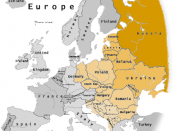Communism in the Eastern Europe was a tragedy. It was condemned because the leaders misused it. It was lack of support from other nations, and there was no efficient solution to save the economy from its downfall. However, it was Gorbachev's reformation that truly brought Communism in Eastern Europe to its end. It proved that Communism in Eastern Europe was just a theory that did not work in reality.
Originally, Karl Marx invented the theory of Communism. It was the movement that meant to overthrow the capitalist order by revolution (The Columbia Encyclopedia). Marx's intention was to establish a classless society in which all property would be state owned. The state that was run by workers, or proletariats, instead of ruler; he wanted to create a ruler-less state. Marx thought that the ruthless government of Tsar had already spoiled the workers and sooner or later there would be revolution. It was just a matter of time.
Eventually, the Soviet would seek for his ideology of Communism. Ideally, the society provided equal sharing of work, according to ability, and all benefits, according to need. (Funk & Wagnalls New Encyclopedia) The private property was abolished. However, Lenin and Stalin modified Marx's theory of Communism, which altered the actually meaning of the theory. This modification contributed to the collapse of Communism in Eastern Europe. The reformation of Gorbachev was an excellent example to prove this. Under the rule of Lenin, there could be only one party, which was the Communist, to run the government. Opposition parties were all eliminated. This was different from Marx's originally intention to have a state rule without ruler. Lenin made himself the dictator and the Communist parties held the total power. There were no allow criticizing the government publicly, and freedom of speech was being taken away. There...


